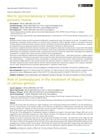 10 citations,
May 2020 in “Dermatology Research and Practice”
10 citations,
May 2020 in “Dermatology Research and Practice” Proteoglycans are important for hair growth, and a specific treatment can help reduce hair loss.
 218 citations,
January 2013 in “The Lancet Oncology”
218 citations,
January 2013 in “The Lancet Oncology” Chemotherapy causes hair loss by damaging hair follicles and stem cells, with more research needed for prevention and treatment.
 54 citations,
September 2012 in “Dermatologic Clinics”
54 citations,
September 2012 in “Dermatologic Clinics” Some medications can cause hair loss, but stopping the drug usually leads to recovery within 3 months.
 1 citations,
January 2021 in “Acta dermatovenerologica Alpina, Pannonica et Adriatica (Tiskana izd.)”
1 citations,
January 2021 in “Acta dermatovenerologica Alpina, Pannonica et Adriatica (Tiskana izd.)” High prolactin levels might be linked to hair loss in autoimmune thyroid disease, but more research is needed.
November 2024 in “Biochemical and Biophysical Research Communications” Abnormal gene expression related to keratin causes hair loss in certain mice.
Certain genes may influence hair loss differently in men and women.

Avicennia marina extract and avicequinone C can potentially promote hair growth and treat hair loss by interfering with hair loss mechanisms and boosting growth factors.
 20 citations,
September 1978 in “International Journal of Dermatology”
20 citations,
September 1978 in “International Journal of Dermatology” Hair growth is influenced by factors like genetics and nutrition, and more research is needed to understand hair loss and growth mechanisms.
 April 2024 in “bioRxiv (Cold Spring Harbor Laboratory)”
April 2024 in “bioRxiv (Cold Spring Harbor Laboratory)” GRK2 is essential for healthy hair follicle function, and its absence can lead to hair loss and cysts.
23 citations,
December 1991 in “Annals of the New York Academy of Sciences” Balding scalps slow down hair growth.
 January 2025 in “Scholars Journal of Medical Case Reports”
January 2025 in “Scholars Journal of Medical Case Reports” Quetiapine may cause hair loss.
 3 citations,
April 2021 in “Biomolecules & Therapeutics”
3 citations,
April 2021 in “Biomolecules & Therapeutics” The protein ER71/ETV2 helps regrow hair after chemotherapy by improving the growth of new blood vessels.
 July 2021 in “Journal of dermatology research and therapy”
July 2021 in “Journal of dermatology research and therapy” COVID-19 may worsen hair loss, and Nourkrin® could be a safe treatment option, but more research is needed.
 10 citations,
December 2021 in “Frontiers in cell and developmental biology”
10 citations,
December 2021 in “Frontiers in cell and developmental biology” Glypican-1 is important for blood vessel growth in hair follicles and could help treat hair loss.
 174 citations,
November 2002 in “Expert Reviews in Molecular Medicine”
174 citations,
November 2002 in “Expert Reviews in Molecular Medicine” Hair loss needs more research for better treatments.
 3 citations,
December 2022 in “npj Regenerative Medicine”
3 citations,
December 2022 in “npj Regenerative Medicine” HSPGs help control stem cell behavior, affecting hair growth and offering a target for hair loss treatments.
 September 2021 in “Медицинский совет”
September 2021 in “Медицинский совет” Proteoglycans, especially in Nourkrin®, can effectively and safely treat hair loss.
 December 2024 in “Фарматека”
December 2024 in “Фарматека” Oral collagen combined with other treatments effectively reduces hair loss and improves hair quality in telogen effluvium.
 1 citations,
October 2020 in “Journal of Investigative Dermatology Symposium Proceedings”
1 citations,
October 2020 in “Journal of Investigative Dermatology Symposium Proceedings” The summit concluded that new treatments like Jak inhibitors show promise for Alopecia Areata and personalized approaches are needed.
 November 2017 in “British Journal of Dermatology”
November 2017 in “British Journal of Dermatology” Genes controlling hair growth and immune response are disrupted in male pattern baldness.
 April 2012 in “KSBB Journal”
April 2012 in “KSBB Journal” Minoxidil analogs can be improved for hair growth inhibition by modifying specific parts of their structure.
February 2023 in “International journal of molecular sciences” Infrared spectral imaging can effectively study protein distribution in hair follicles during hair growth.
 September 2023 in “Curēus”
September 2023 in “Curēus” Alopecia areata may be linked to hearing problems, so patients should monitor their hearing.
 18 citations,
September 2018 in “Current Pharmaceutical Design”
18 citations,
September 2018 in “Current Pharmaceutical Design” Some medicinal plants may treat hair loss with fewer side effects.
January 2025 in “Molecules” Caffeine may help with hair loss, but more research is needed to confirm its effectiveness.
March 2022 in “International Journal of Trichology” Smoking may worsen hair loss, but more research is needed.

Low-level laser therapy may help stem cells grow and function better, aiding in healing and tissue repair.
 27 citations,
February 2017 in “Clinical, Cosmetic and Investigational Dermatology”
27 citations,
February 2017 in “Clinical, Cosmetic and Investigational Dermatology” New compounds were found to help increase hair growth and decrease hair loss.
 February 2025 in “Healthcare”
February 2025 in “Healthcare” Caffeine may help with hair loss, but more research is needed.
114 citations,
March 2010 in “Zebrafish” PROTO1 and PROTO2 protect against hearing damage.






















